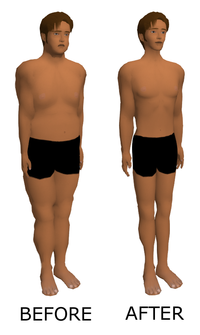
Photo from wikipedia
Our research group recently wrote and published a systematic review and meta-analysis examining the effects of multidisciplinary weight loss interventions on obstructive sleep apnea (OSA) in youth with obesity [1].… Click to show full abstract
Our research group recently wrote and published a systematic review and meta-analysis examining the effects of multidisciplinary weight loss interventions on obstructive sleep apnea (OSA) in youth with obesity [1]. Our analysis led us to conclude that such multidisciplinary weight loss programs have beneficial effects on OSA severity and sleep duration in this population. In their recent comment, Carneiro-Barrera et al. detail some methodological limitations they observed in our approach, particularly pointing the inclusion within our meta-analysis of studies conducted by the same groups and presenting results from similar participants [2]. First, we would like to thank Carneiro-Barrera et al. for their constructive comment that unfortunately concerns a quite large number of published meta-analyses. Although we agree with the comments from Carneiro-Barrera et al. concerning the fact that some data from our meta-analysis work may overlap, we would like to highlight that this limitation was explicitly and conscientiously mentioned several times in the manuscript; in the limitation section as well as in the conclusion. This specific limitation led us to call for further clinical trials appropriately investigating the effect of multidisciplinary weight loss programs on OSA in this population. Excluding all studies using overlapping data would have caused a loss of information. On the other hand, overlapping due “to same data” issues leads to between-studies dependence; i.e., estimates are greatly dependent as they are generated by the same data. Because of the scarcity of studies on the topic, we have chosen to still include studies with overlapping data while attempting to minimize the between-studies dependence by specifying this effect in random-effects models. Furthermore, to evaluate the impact of “same data” studies, sensitivity analyses have been conducted in our work (last paragraph of the meta-analysis procedure), for example choosing one study among tested studies and excluding others which use the same data and using funnel plots. In the funnel plots, we found that studies were distributed evenly around the main effect size, confirming the absence of bias. Hence, we agree that the proposed meta-analysis must be interpreted with caution, as underlined by Carneiro-Barrera et al. in their comment and our group in the discussion section of the published review. However this meta-analysis followed
Journal Title: International Journal of Obesity
Year Published: 2020
Link to full text (if available)
Share on Social Media: Sign Up to like & get
recommendations!